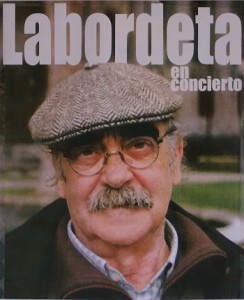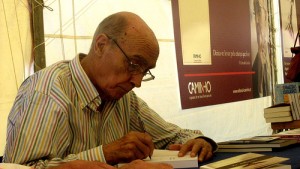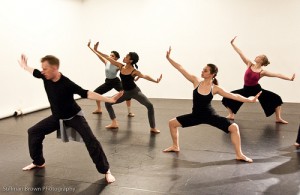Who said Spanish satire was dead? Well, I did, for one. Discouraged by the disappearance of TV latex puppets Los Guiñol and their real-life counterparts on Caiga quien caiga, and disheartened by the lack of laughs afforded by El Jueves magazine, it seemed to me the satirical landscape looked worryingly barren. But things suddenly looked a good deal rosier when I came across a string of news-related-but-not-quite-real headlines on website elmundotoday.com: “He shot at a wild boar, thinking it was his mother-in-law”, or “Argument over Dostoyevksy sparks Latin Kings gang fight”, or, more topically, “Congress approves law of the jungle”. El Mundo Today is run by Xavi Puig and Kike García, … [Read more...] about El Mundo Today keeps Spanish satire alive and kicking
Culture
Labordeta: Aragon’s protest-song politician
Politics and sport don’t mix, so the saying goes. Except in the case of Madrid’s working class heroes Rayo Vallecano. The third-tier soccer club’s famously leftist fans observed a minute’s silence before the start of their game on September 26 against Aragonese side Huesca in memory of José Antonio Labordeta, the singer, poet, and politician who died on September 18 after a long illness. Labordeta came to prominence in the final years of the Franco regime by combining traditional Aragonese tunes with modern Spanish folk music, and captured the spirit of a generation tired of waiting for the dictator to die. Over the years he stuck to his principles, vociferously opposing Spain’s initial … [Read more...] about Labordeta: Aragon’s protest-song politician
Farewell to the restless soul of Madredeus
During the now-legendary beginnings of Madredeus in the late eighties, the group rehearsed in the wing of an old Lisbon convent. For anyone who has heard them, this was a perfect venue for their fado-influenced folk music. After those modest beginnings, Madredeus would go on to sell millions of records and become a success not just in their native Portugal, but worldwide. Yet founding member Francisco Ribeiro, who died on September 14 at the age of 45 from liver cancer, gave the impression that he would rather play his cello back in that old convent by the River Tagus, than tour the world as part of such a wildly successful group. “(Ribeiro was a) fragile person, in the most hardworking … [Read more...] about Farewell to the restless soul of Madredeus
Santiago Segura is Torrente… and an incurable romantic
Gladdened by the recent news that Santiago Segura is making his fourth Torrente film, and in 3D, I was prompted to illegally download and re-watch the three previous movies in the series. Like his hero Peter Sellers, who for most movie fans will forever be Inspector Clouseau, Spanish comic Santiago Segura seems unable, or unwilling, to shake off his alter ego, Inspector José Luis Torrente. Little wonder: the racist, sexist, homophobic Madrid cop is one of the biggest pulls in Spanish cinema. Torrente 2: Mission in Marbella, made in 2001, remains the most profitable Spanish film of all time. The Torrente formula is simple: lots of smutty jokes at our hero’s expense; plenty of gratuitous … [Read more...] about Santiago Segura is Torrente… and an incurable romantic
Javier Bardem and Penélope Cruz: compare and contrast
Having appeared in several films together dating back to the beginnings of their careers in the early 1990s, and being the first Spanish actors to be nominated for Oscars, then the first to win the coveted statuette, there seemed a certain inevitability about Javier Bardem and Penélope Cruz’s announcement in July that they had finally got married. Needless to say, the media made great play of two Academy Award winners tying the knot: as more than one story trumpeted, it’s a “marriage made in Oscar heaven.” For the domestic press this was yet another example of Spain’s international success, —somewhat overshadowed by the World Cup, it has to be said— while for the rest of the world there … [Read more...] about Javier Bardem and Penélope Cruz: compare and contrast
Saramago: Iberia’s Godless conscience
“With a rapid movement, what was in sight has disappeared behind the man’s clenched fists, as if he were still trying to retain inside his mind the final image captured, a round red light at the traffic lights. I am blind, I am blind, he repeated in despair as they helped him to get out of the car, and the tears welling up made those eyes which he claimed were dead, shine even more.” (From Blindness). Given that his life was so often filled with polemic, perhaps it was fitting that José Saramago’s death should be surrounded by controversy. The late Portuguese novelist would have smiled from the afterlife –if he had believed in it– at the idea of the Vatican and his country’s president … [Read more...] about Saramago: Iberia’s Godless conscience
Retreading a Basque past in three dimensions
“Anyone who approaches the Basques without prejudices will find them of great interest, not as an exception among the other races in the world, but as a living museum of man’s history, where one can understand and see what remains of an ancient Europe, now disappeared from other regions, but which is still alive in this peaceful corner of the Pyrenees.” So wrote British author Rodney Gallop, in his 1930 study of the Basque Country. In the eight decades since, much may have changed in the region, but its allure for foreign intellectuals has refused to dim, with the likes of Ernest Hemingway, Orson Welles and American writer Mark Kurlansky, all falling under its spell. Irish writer Paddy … [Read more...] about Retreading a Basque past in three dimensions
Bringing ballet in from the cold
The news that Nacho Duato will be leaving the Compañía Nacional de Danza (CND) in July after 20 years at the helm ushers in a new era for dance in Spain. His early exit is triggered by the Culture Ministry’s recent and momentous decision that from now on the state company must offer classical and neoclassical dance, instead of just the contemporary choreographies that Duato specializes in. This is in fact what the CND should have been doing all along, Duato’s critics feel, noting that in recent years its artistic director has been running the public company like a private feifdom. By offering to extend his soon-to-expire contract to 2011, the authorities hoped that Duato would agree … [Read more...] about Bringing ballet in from the cold
Madrid, capital of the special advertising section
The other evening, while enjoying a quiet drink in a Madrid hotel bar, I struck up a conversation with an attractive, if over-groomed, young woman and her improbably handsome and well-dressed companion. The former was French, the latter American. Still in their mid-twenties, they seemed wealthy, and were well traveled, having made a number of references to returning from, or going to, exotic, far-away locations. Eventually I asked what they did for a living. “We work for an international company that sends us around the world,” the woman answered mysteriously. “Oh,” I said, asking on a hunch, “do you work in advertising?” “Well, kind of,” answered the woman, with the air of somebody … [Read more...] about Madrid, capital of the special advertising section
Farewell to Delibes’ rural dissent
Miguel Delibes, who died on March 12 at the age of 89, was born in Valladolid, the capital of Castile, where he lived his entire life. He was typically Castilian in many ways: serious, courteous and unostentatious to the point of austere; less common in this conservative region, he was also a liberal democrat. Delibes described his work as “Castile speaking”; he spoke of the lives of rural people and the disappearance of rural communities as Franco tightened his stranglehold on the countryside in the 1950s and 1960s through an unholy alliance between landowners and the Catholic Church. Like many other artists who lived through the Franco years, Delibes spent his life fighting a … [Read more...] about Farewell to Delibes’ rural dissent









